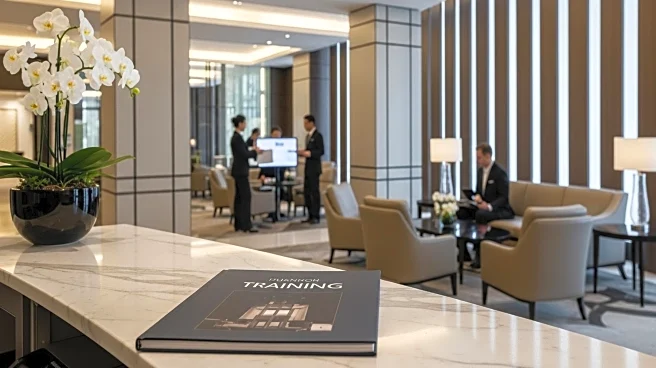What's Happening?
The hospitality industry is undergoing a transformation in its approach to employee training, moving away from traditional checklist-based methods to more engaging and meaningful practices. This shift is driven by the need to address high turnover rates and the expectations of Gen Z employees, who prioritize purpose, fairness, and recognition in their work environments. The new training model emphasizes cultural integration, personal growth, and resilience, with practices such as micro-coaching, fair recognition systems, and stress simulations. These methods aim to build a sense of belonging and commitment among employees, ultimately enhancing their loyalty and performance.
Why It's Important?
This change in training methodology is significant for the hospitality industry, which faces challenges related to employee retention and satisfaction. By focusing on cultural integration and personal growth, hotels can create a more supportive and engaging work environment, reducing turnover rates and improving service quality. The emphasis on resilience and adaptability prepares employees to handle unexpected situations, enhancing their confidence and effectiveness. As Gen Z becomes a larger part of the workforce, these training practices align with their values, potentially attracting and retaining talent in a competitive market.
What's Next?
Hotels are expected to continue refining their training programs to better meet the needs of their employees and the demands of the industry. This may involve further integration of technology to ensure consistency and scalability, while maintaining a human touch to foster connection and support. As these practices become more widespread, other industries may adopt similar approaches to enhance employee engagement and retention. The success of these initiatives could lead to broader changes in workplace culture, emphasizing the importance of purpose and recognition in employee development.
Beyond the Headlines
The shift in training practices highlights the evolving expectations of the workforce, particularly among younger generations. It underscores the importance of creating work environments that prioritize employee well-being and development, rather than merely focusing on compliance and technical skills. This approach may lead to long-term cultural shifts in the hospitality industry, where employee experience is seen as integral to guest satisfaction and business success. The emphasis on resilience and adaptability also reflects broader societal trends, where individuals are encouraged to develop skills that enable them to thrive in uncertain and rapidly changing environments.











